Masters of War and With God On Our Side
Masters of War and With God on Our Side can be considered to be the most didactic and moralistic examples of Bob Dylan’s early ‘protest’ material. Jesus and Judas are mentioned in both songs. Dylan’s uses these two figures to represent polar moral opposites – good and evil, faith and betrayal. Ironically, in 1966 he was famously accused of being a ‘Judas’ himself when he ‘went electric’ and abandoned overtly political song writing. Much later in his career he would, to the surprise and consternation of many of his fans, actually ‘embrace Jesus’.
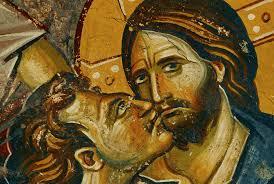
Both songs were written in the wake of the Cuban Missile Crisis of October 1962, in which the entire world faced an unprecedented existential threat. By then, Dylan had already composed several anti-war songs. Blowin’ in the Wind delivers its universal message through a series of metaphorical propositions, while the apocalyptic A Hard Rain’s a-Gonna Fall spirals off into a series of riveting concrete poetic images. Even more pertinently, Let Me Die in My Footsteps is a strident and eloquent refusal to enter a fallout shelter. But in the two post-Crisis songs Dylan has clearly decided that ambiguity is not the order of the day. He relies on a kind of dramatic ‘plain speak’ in order to expose the greed, hypocrisy and mendacity of politicians, religious leaders and those who profit from war, quite explicitly presenting himself as a national ‘public poet’ or bard.
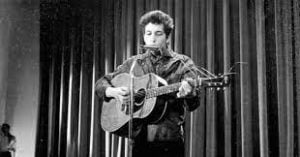
Neither song deals explicitly with the recent nuclear standoff, although Dylan did make an attempt at writing such a song. In March 1963 he made a very primitive recording in the offices of Broadside magazine of Cuban Missile Crisis, based on Woody Guthrie’s tale of the ‘virtuous outlaw’ Pretty Boy Floyd. There are only three verses:
…Come gather ’round you people, a story I will tell
About a night not long ago, you all remember well.
I tell it to you straight and true, I tell it like a friend
All about the fearful night, we thought the world would end.
I was walkin’ down the sidewalk not causin’ any harm
The radio reported, it sounded with alarm
The Russian ships were sailin’ all out across the sea
We all feared by daybreak it would be World War Number Three.
I was worried about an argument I had the day before
Over some small matter, I’m sure it was nothin’ more.
But just a day ago, how it wrinkled up my brow
The same thing today seems so unimportant now…
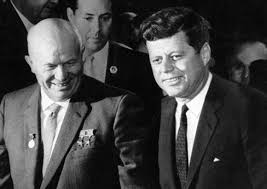
KRUSCHEV AND KENNEDY
Masters of War and With God On Our Side
The song was never released, and the lyrics have never appeared in any official Dylan song book or on his official website. This is hardly surprising, as they appear to have been ‘dashed off’ with little real thought. Masters of War and With God on Our Side, however, take broader approaches to the subject, focusing on those who create, justify and profit from wars.
In both songs Dylan appears to adopts a decidedly moral, quasi-religious and judgemental stance. At this point in his career he professed belief in no particular religion. In interviews he was often ambivalent about his Jewish upbringing. Yet, perhaps under the influence of the many blues and gospel singers he so admired, he always seemed to have a general respect for religious belief and a definite leaning towards monotheism. Blowin’ In the Wind was adopted by many gospel choirs as a kind of ‘secular hymn’. He was particularly attracted to Biblical themes of divine judgement and vengeance. In A Hard Rain’s a-Gonna Fall he adopts the stance of a Biblical prophet, picturing himself as standing on a mountain and surveying the devastation below. In his evocation of ‘generational revenge’ When the Ship Comes In he pictures those who stand up against the inevitability of change as being drowned ‘like Pharoah’s tribe’. In one of his early unreleased songs I’d Hate to Be You On That Judgement Day, the unnamed subject of the song (the nature of whose heinous sins are rather opaque), reaches ‘St. Peter’s Gate’ but is turned away from heaven. At New York Town Hall in 1963 Dylan prefaces When the Ship Comes In by a comparison to David and Goliath. Before performing Masters of War he declares, perhaps surprisingly, that …I believe in the Ten Commandments. The first one is I am the Lord thy God….. He follows this with an unexpected but extremely vicious put down: … It’s a great commandment if it’s not said by the wrong people…
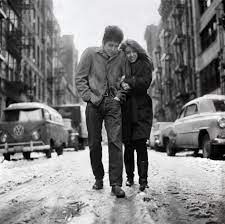
Both songs use melodies which are adapted from traditional ballads. Masters is based on the American folk song Nottamun Town (which Dylan had heard in a version by folk singer Jean Redpath) and With God on the Irish air The Merry Month of May (as filtered through Dominic Behan’s well known IRA ‘rebel song’ The Patriot Game). The wistfully beautiful melody of The Merry Month of May provides a powerful contrast to the harshness of the lyrics. Nottamun Town is a rather surreal ‘medieval nonsense song’ with a very strong rhythmic emphasis. Later versions of the song, such as that of Bert Jansch (1966) and the ’electric folk’ reading by Fairport Convention with Sandy Denny on vocals (1969), are in turn influenced by Dylan’s adaptation.

Dylan presents Masters of War through the voice of an uneducated ingénue – manifested in the use of some deliberately ungrammatical and colloquial phrasing. He thus connects directly with his youthful and anti-establishment audience, targeting the cowardice and hypocrisy of those unnamed ‘Masters’, who he personifies first as a collective and ultimately as a single person. The sentiments are expressed less through metaphor than through diction …Come you masters of war…. he declares with immediate combativeness …You that build all the guns, you that build the death planes, you that build all the bombs… The power of the rhetoric is expressed through rhythmic repetition and alliteration. Here we get three instances of ‘build’, which quite deliberately ‘build’ towards the literally ‘explosive’ alliterative pararhyme of ‘bombs’. This effect is emphasised through the use of single syllable words, a technique which is (very ironically) reminiscent of lines from Winston Churchill’s wartime speeches such as …We will fight them on the beaches…. The direct address to ‘you’ is maintained throughout the song, which is set out entirely in rhyming couplets. The first verse concludes with more dramatic repetition …You that hide behind walls, you that hide behind desks/ I just want you to know I can see through your masks… The pararhyme of ‘desks’ and ‘masks’ again suggests a certain kind of dislocation.

Dylan mixes naive ungrammatical diction and apparently naive rhetoric: …You never done nothing but build to destroy/ You play with my world like it’s your little toy… The following …You put a gun in my hand and your hide from my eyes… is in fierce contrast to the ‘childlike’ imagery of the previous line. Then we get the devastating ...Then you turn and run farther when the fast bullets fly… Dylan piles on the moral disgust, firstly evoking the Biblical betrayer: …Like Judas of old, you lie and deceive… rhyming this with …a world war can be won, you want me to believe… The fact that the narrator appears to be struggling for words here only adds to the rhetorical power of the discourse. This line is the only one in the song which is specifically connected to the Cold War and the Cuban Missile Crisis. It clearly acknowledges that the kind of ‘world war’ that could have been sparked off in 1962 could never have any true victors as it would be a war of mutual annihilation. The apparently clumsy and inelegant metaphorical lines which follow: …and I see through your eyes, and I see through your brain, like I see through the water that runs down my drain… are again couched in the voice of a naive narrator. In an echo of his repeated use of ‘build’ in the first verse, Dylan uses the triple repetition of ‘see through’ and the metaphorical ‘drain’ (which is, of course, full of filth) to increase our empathy with the narrator’s disgust.
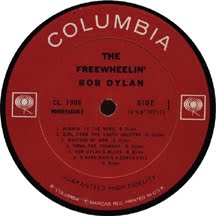
Dylan builds up this sense of disgust until it reaches a very shocking conclusion. In a line that evokes the First World War, we hear that the …young people’s blood/ Flows out of their bodies and is buried in the mud… Another ‘awkward’ rhyme follows, in which the narrator rails against …the worst fear that can ever be hurled/ Fear to bring children into the world…. The narrator then positions himself firmly as the voice of exploited youth wth the deliberately naive: …You might say that I’m young/ You might say I’m unlearned… Then the narrator delivers what are surely the most devastating lines: …But there’s one thing I know, though I’m younger than you/ That even Jesus would never forgive what you do…. This explicitly blasphemous statement appears to represent the narrator ‘giving the finger’ to religious morality. However, the line can also be read as an incredibly powerful evocation of the awesome destructiveness of nuclear weapons. Even Jesus, surely, would not forgive those who obliterated ‘his world’ in a nuclear holocaust. In other words, what the ‘Masters’ are engaging in suggests that the old limits of morality will have to be abandoned. These lines were omitted in most of Dylan’s live performances of the song in his later career, possibly because of their blasphemous nature but also possibly because of the narrator’s stated youth.

The penultimate verse again begins wth the voice of the ‘unlearned’ narrator: …Let me ask you one question, is your money that good?… The ‘Masters’ are now being addressed directly, as if they are one person. The question of their salvation is then considered …Will it buy you forgiveness/ Do you think that it could?… is a pointed rhetorical question. The narrator then comes on like a vengeful ‘hellfire’ preacher, still making his pronouncements in single syllable words: …I think you will find, when your death takes its toll/ All the money you made will never buy back your soul…. Finally the narrator delivers the most ‘shocking’ lines of all as he contemplates the Masters’ death with obvious relish …And I hope that you die, and your death will come soon/ I’ll follow your casket in the pale afternoon/ And I’ll watch while you’re lowered into your death bed/ And I’ll stand over your grave till I’m sure that you’re dead… In the sleeve notes to the Freewheelin’ album Dylan comments: “I don’t sing songs which hope people will die, but I couldn’t help it in this one.”
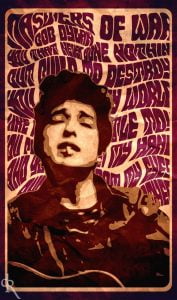
In the highly evocative opening lines of With God on Our Side Dylan takes what for him is an unusual step, beginning by identifying himself as the narrator: …Oh, my name it ain’t nothing, my age it means less/ The country I come from is called the Mid West… When he first appeared as an aspiring folk singer in Greenwich Village he made various pronouncements both to friends and to reporters, spinning a fanciful tale of a childhood spent working in carnivals across the country (not to mention encountering various legendary blues artists along the way. Such ‘inventions’ were soon exposed. In the beautifully evocative nostalgic love song Girl from the North Country (1963) and the tale of hard pressed working people North Country Blues (1964) he clearly draws on his own Midwestern background. The suggestion appears to be that a person from ‘the Mid West’ may be less educated or politically aware than sophisticated city dwellers from places like New York and Los Angeles. Although, as with Masters of War, the narrator appears to assume a faux-naive persona, lines such as …I was taught and brought up there, the laws to abide/ And that the land that I live in has God on its Side… are in fact also startlingly honest and truthful. The statement is one with which millions of Americans – a country in which school children salute the flag every morning – can strongly identify.
In the next four verses, all of which are delivered as four sets of rhyming couplets, Dylan conducts a kind of historical survey of the wars the USA has been involved in, beginning with the Indian War, followed by the Spanish-American War, the Civil War and the First and Second World Wars. In each case the ‘excuses’ for the carnage appear to be tacitly accepted by the narrator. The slaughter of the Native Americans is justified because …the country was young… He tells us that he was ...made to memorise… the names of the ‘heroes’ of the Civil War. Then he begins to feign a kind of naive confusion. When referring to the first World War he confesses that …the reason for fighting I never could get… The line …But you don’t count the dead when God’s on your side… is especially chilling, conjuring up visions of the mass slaughter of Mons and the Somme.
By this point the child-like irony of …The second world war, boys, it came to an end/ We forgave the Germans and then we were friends… now appears to morph into an increasingly righteous anger…Though they murdered six million, in the ovens they fried/ The Germans now too have God on their side…. This is an ironic comment on how national villains can become heroes when political alliances change, as satirised by George Orwell in 1984. Dylan then confesses that …I’ve learned to hate Russians all through my whole life…. He tells us that he has learned to …hate them and fear them/ To run and to hide, and accept it all bravely with God on our side… In interviews for the 2005 documentary No Direction Home Dylan was still expressing vehement disgust with the way in which, as a child at school in the 1950s, he and his classmates were trained to hide under their desks in preparation for a Soviet attack. In Let Me Die in My Footsteps he calls this …learning to live instead of learning to die…

In the last three verses Dylan moves away from the ‘history lesson’ and begins to ask more searching questions. He now faces up to the threat of nuclear weapons, which he describes as being composed of …chemical dust… The following couplet …One push of the button, and a shot the world wide… ends with the cynical resignation of …And you never ask questions when God’s on your side… He then moves rather unexpectedly into philosophical and metaphysical realms …through many dark hours… he tells us …I been thinking about this/ that Jesus Christ was betrayed by a kiss… then asks …Did Judas Iscariot have God on his side?… In Masters of War the figure of Judas is referred to conventionally as a lying villain. But here there is a hint of sympathy for the betrayer. The question examines the conventional theological view that the betrayal was part of ‘God’s plan’. Here it is suggested that Judas was a mere ‘pawn’ – perhaps even a victim. But the question – which later supposedly inspired lyricist Tim Rice to create a sympathetic Judas in the musical Jesus Christ Superstar – is particularly open ended. Did Judas really believe he was doing the right thing, or did he even care? Was his betrayal predestined? And, by implication, were all the terrible wars Dylan recounts actually part of some divine plan? In which case, what kind of God do Christians and Jews follow? Is He a being who sanctifies mass murder? Is He even, in reality, the Devil? There are indeed some Christians who believe that a future nuclear war may be the War of Armageddon as prophesised in the Book of Revelations. Many Christians believe in the imminence of the ‘End of the World’ in which the ‘elect’ of believers will be saved to live in a ‘heaven on earth’ under a kind of divine if benevolent dictatorship. Dylan’s lines invite the listener to consider these questions but concludes that …I can’t think for you, you’ll have to decide…
It might be argued that this is where the song should have ended. This might perhaps have been more ‘poetically satisfying’. But Dylan returns to a more prosaic resolution, cutting through all the metaphysical speculation which he admits has made him …weary as hell… He concludes with the acerbic observation that …If God’s on our side, he’ll stop the next war… As his listeners were well aware, there was little sign of divine intervention in any of the proxy wars currently fought by the American and Soviet acolytes. But rather than condemning the religious as fools and hypocrites, Dylan appears to leave space here for the ‘reclamation’ of God as a benevolent rather than a bellicose force.
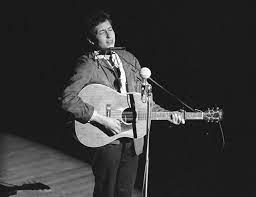
Many of Dylan’s fans might have expected him to continue writing such songs throughout his career. But by the time he released his next album Another Side of Bob Dylan in late 1964, he had already moved on. The album’s one apparent ‘protest song’ Chimes of Freedom is a much more generalised and conventionally poetic statement about inequality and oppression. In My Back Pages Dylan looks back on the certainty he felt in writing such songs with considerable doubt, rejecting the seemingly venerable role of ‘public poet’ and embracing his own youthful exuberance in the memorable logical reversal of …I was so much older then/ I’m younger than that now… Even It Ain’t Me, Babe, which is apparently a ‘love song’, express a firm denial of the role of ‘saviour’ or ‘prophet’ which some fans had already assigned to him. Despite the pleadings of Joan Baez and others, he detached himself entirely from any political protest movements. In the anti-Vietnam protests that grew in size throughout the rest of the 1960s, despite his songs being adopted as anthems by the demonstrators, Dylan was nowhere to be seen. Perhaps he was afraid of being seen as a political figure who could be used by politicians. He was indeed later courted by future Democratic Presidents Jimmy Carter and Barack Obama.

When Dylan moved away from political song writing in the mid-1960s, these songs were dropped from his repertoire. But from the mid ‘70s onwards, he began to ‘reclaim’ his old songs in live performance. Inevitably, with the passage of time, they would be sung, played and perceived differently. Live performances of With God on Our Side in Dylan’s later career have been limited, although the song has remained a staple of Baez’s live shows. Apart from 1988, the first year of the Never Ending Tour, when it featured in the set seven times, there are only eight known performances. This is perhaps a shame, as the original version is somewhat lacking in vocal variation and is backed up by very basic and limited strumming. The versions that Dylan and Baez sang together, such as the one recorded at Newport Folk Festival in 1963 (as featured in the film Through the Looking Glass), feature their two very different voices straining awkwardly to achieve any kind of harmony. In the later live versions are marked by the use of more sophisticated and varied vocal nuances.
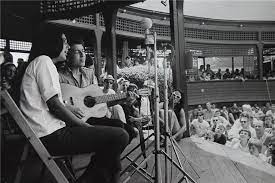
DYLAN AND BAEZ AT NEWPORT FOLK FESTIVAL 1964
Dylan also adapted some of the lyrics of With God in later performances to reflect contemporary mores. At Providence Rhode Island in November 1975 the line about ‘hating the Russians’ was extended to include …China, Korea, Vietnam, Bulgarian Poland, South America and Cuba… In 1988 an extra verse was added: … In the nineteen-sixties came the Vietnam War/ Can somebody tell me what we were fighting for?/ So many young men died, so many mothers cried/ Now I ask the question, was God on our side?… This verse was also included in the MTV Unplugged TV performance of 1994 (in a vocal performance that was arguably the highlight of a relatively underwhelming show) but the song has only been performed on a couple of occasions since then. Masters of War, in contrast, has been a constant feature of Dylan’s sets from 1978 onwards, usually in an electric rock version. With its strident rhythm, the song could easily be adapted to this format. At the Grammy’s Ceremony in 1991, at which Dylan rather reluctantly accepted a ‘lifetime achievement’ award, he performed a notorious speeded up version of the song, with almost unintelligible lyrics in which the ‘heavy’ sound of the band appeared to echo the horrors of the First Gulf War, which the USA was then engaged in. Both songs have been subjected to hundreds of cover versions, and have been favourites of many street buskers. A particularly moving With God was recorded by the Neville Brothers (with Aaron Neville on wonderfully tremulous vocals) in 1988, marked by Daniel Lanois’ distinctively ethereal production. No doubt both songs will continue to be recorded by many artists in future. It can only be considered to be a sad fact that both are still highly relevant today.
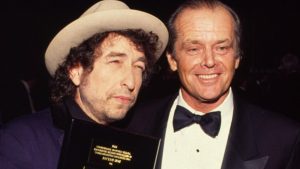
DYLAN WITH JACK NICHOLSON, GRAMMYS 1991
https://www.youtube.com/watch?v=0O3Ud8nFLE4
DAILY DYLAN NEWS at the wonderful EXPECTING RAIN
THE BOB DYLAN PROJECT- COMPREHENSIVE LISTINGS
STILL ON THE ROAD – ALL DYLAN’S GIGS
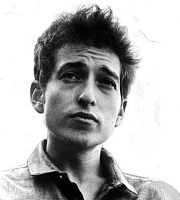


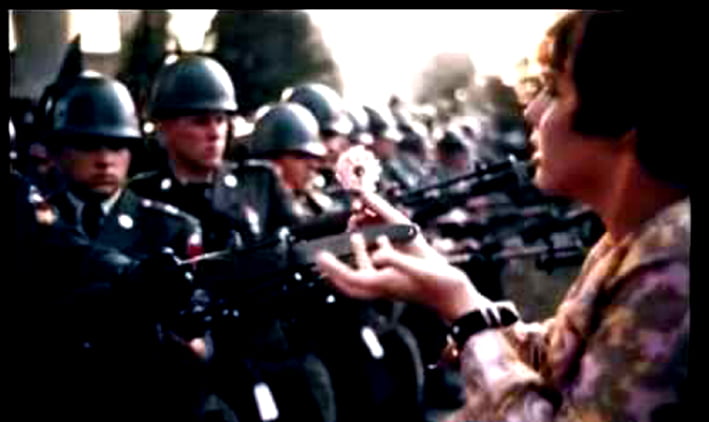
Leave a Reply